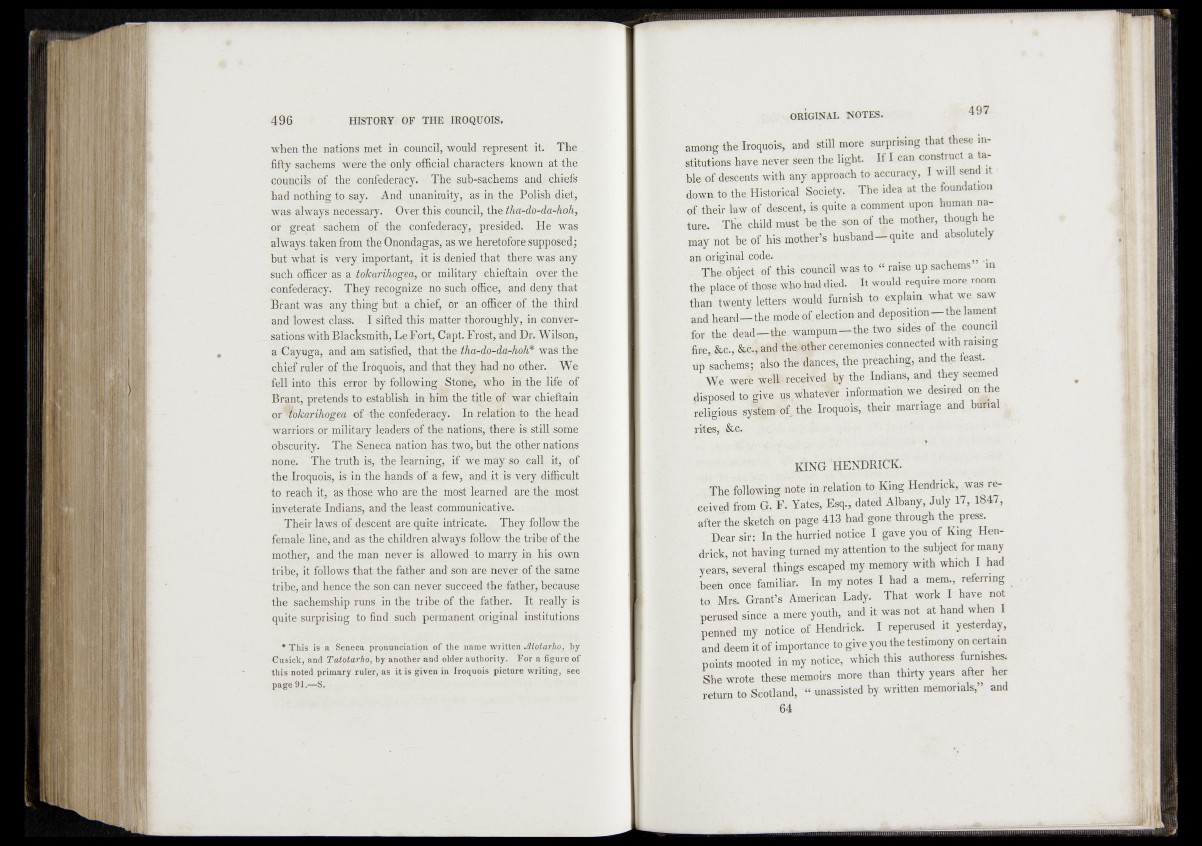
when the nations jnet in council, would represent it. The
fifty sachems were the only official characters known atThe
councils of the confederacy. The sub-sachems apd. chiefs
had nothing to say. And unanimity, as in the Polish diet,
was always necessary. Over this cquncil, the tha-dv-da-'hoh,
or great sachem of^the confederacy, presided. He was
always taken from theOnondagas,- as we heretofore supposed;
hut whatsis; very_ important, it is denied that thererwas any
such officer, as a tokurihogea, or' military chieftain over the
■confederacy. They recognize no such office, and deny that
Brant was any thing hut a chief, ox'an officer of the third
and lowest class. I sifted this matter thoroughly, imconversations
with Blacksmith, I<eiFort, Capt. Erost, and Dr, Wilson;
a Cayuga, and am satisfied, that, the tha-do-da-hah* was the
chief ruler of the Iroquois, and tfiat they, had-no other. We
fell into this feiTQf ,hy fo llow in g^ to^ who jn tfie life-of
Brant, pretends to establish-in hi® the tjtleof war chieftain
0^^)Tcdrihdgea ©f 4he confederacy.. In rddSonjta the head
warriqrs.or military leaders of the na-tiops, There is still'some
obscurity. The Seneca nation has. twos, but the. other nations
none. The truth is, ^he learning, if we maysoT-call it,, of
the Iroquois, is in the hands of a few, and. i£js 'very difficult
to reach it, as those who are Ike' most learned-are,the -most
inveterate Indians, and the least communicative.»!;.
Their laws of descent are,quite intricate. ; They follow the
femalehne, and as the children always follow the tribe of sthe
mother, and the man never is allowed to marry in his own
tribe, it follows that the father and son are "never of the same
tribe, and hence the son cfin never succeed the.fiather, b e c a u s e
the saehemship runs in the tribp of ..the father. I t really ip-
quite surprising to find such permanent original institutions
* T h i s ; i s . a S en e c a p rp n u fic ia lig n ^*.e n am e w ritt e n Atotarho, b y
-Utrsicky a n d TatotdfMj k y 'a n o th e r'a rirf p ld e r a u t h o r i ty ., ,-®ot a f lk y r e ° f
th i s n o te d p r im a r y r u l e r , a s it- is g iv e n in I ro q u o is p ic tu r e w r itin g , s e e
p a g e 91.^— :• |
amdng thé Iroquois, and still more surprising that these institutions,
»have neyer seen the light If I can construct a table
of descents with any abroach to accuracy, I will send it •
down tb -the Historical Society.- The idea at the foundation
of their kw of descent, is quite a comment upon human nature.
The child must be the son pf the mother, though he
may not he of his mother’s husband— quite and absolutely
.V_, . ;
- Tbe-object of it h i s council was to- “ raise up sachems in
the place of those w f io -had diqd. , I t would require more room
than tw e n t y letters would furnish to explain what we saw
and h e a r d — tfie m o d e -of election and deposition— the lament
.for the dead—the.wampum—the two sitjfes of the council
fiöe &e., ^e.s an(AKéS^er cerémQniesconnected withraismg
I B l P i K K the prea^hag, and the fpast.
: IN ih^ •®^ed
disposed to give qs wfiateW information ,we desired on the
i religious sy% n o fr,ihe Iroquois,, their marriage and buftal
-■ rites, :&c,
KING TlENDRICK.
The following note in relation to King Herïdrick, was re-
. ceived ftpm G; E^Yates, Esq., dated Albany, July 17, 1847,
after "the skgtch on-page 413 had'gone through the press.
Dear sir: In the hurried notice I gave you of King Hen-
-drick, not having turned my attention to the subject for many
; -years, several things escaped my memory with which I had
beefa once familiar. In my notes I had a mem., referring
- to. Mrs. Grant’s American Lady. That Work I have not
perused since a mere youth, and it was not at hand when I
penned my noticeof Hendrick. I reperused it yesterday,
and deem it of importance to, give you the testimony on certain
points mooted in my notice, which this authoress famishes,
She wrote these memoirs more than thirty years after her
return to. Scotland, “ unassisted by written akmoriak,” and
64